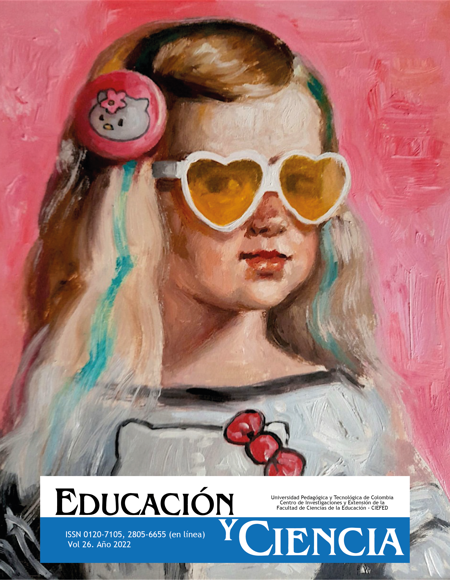An adventure through thought, philosophy and childhood

Abstract
This article presents the results of the project "Pedagogical look at logical thinking in childhood", which is part of the research group Aión: Tiempo de Infancia, of the Universidad Pedagógica y Tecnológica de Colombia. The objective was to promote logical thinking in students from five to six years of age in the transition grade of the Escuela Normal Superior Santiago de Tunja. A documentary compilation was carried out that evidenced the importance of working on logical thinking in the classroom in the early education grades, which contributes to the development of thinking skills. The methodology used was action research, under the qualitative approach, with descriptive design. The study was developed in five phases. For the analysis of results, ATLAS.TI software was used to detail textual coding and to configure semantic networks that graph the relationships between codes and categories. It is concluded that logical thinking, from a philosophical perspective, promotes skills in children that contribute to reflection, argumentation and justification.
Keywords
thinking, logical thinking, thinking abilities, philosophy for children
References
- Bohórquez-Olaya, C., Pulido-Cortés, O., Suárez-Vaca, M., Lara-Buitrago, P., Cañizalez-Mesa, N., Castro-Patarroyo, L., Cruz-Vargas, I., Mariño-Díaz, L., y Patiño-Cuervo, D. (2020). Pensamiento complejo, infancia y educación. Universidad de Boyacá. https://doi.org/10.24267/9789585120099 DOI: https://doi.org/10.24267/9789585120099
- Cerda, H. (2008). Los elementos de la Investigación. Como reconocerlos, diseñarlos y construirlos. El Búho.
- Cerda, G., Pérez, C., Ortega, R., Lleujo, M., y Sanhueza, L. (2011). Fortalecimiento de
- competencias matemáticas tempranas en preescolares, un estudio chileno. Psychology, Society, & Education, 3(1), 23-39. https://core.ac.uk/download/pdf/143455821.pdf DOI: https://doi.org/10.25115/psye.v3i1.550
- Chacón, K. J., y Duarte, L. Y. (2020). Experiencias Filosóficas con la Primera Infancia:
- Entrevista a Walter Kohan. Educación Y Ciencia, (24), e12281. https://doi.
- org/10.19053/0120-7105.eyc.2020.24.e12281
- Gagné, R. (2006). La teoría de aprendizaje de Robert Gagné [Documento de trabajo, Universidad de los Ángeles de Chimbote] http://files.uladech.edu.pe/docente/41916979/PS_APRENDIZAJE/sesion_8/lectura_gagne.pdf
- Hurtado, L. E., y Estupiñán, M. R. (2020). La transición escolar de primaria rural a
- secundaria urbana: una aproximación teórica. Educación Y Ciencia, (24), e11405. https:// doi.org/10.19053/0120-7105.eyc.2020.24.e11405
- Lipman, M., Sharp, A., y Oscanyan, F. (1992). La filosofía en el aula. Ediciones De la Torre.
- Maturana, G, y Lombo, M. (2020). Inteligencia naturalista: efectos sobre el pensamiento crítico y las necesidades de cognición. Praxis & Saber, 11(25), 177-204. https://doi. org/10.19053/22160159.v11.n25.2020.9094 DOI: https://doi.org/10.19053/22160159.v11.n25.2020.9094
- Morales, L., y Pulido-Cortés, O. (2018). Ambientes filosóficos para la lectura en la escuela rural. Praxis & Saber, 9(21), 99-124. https://doi.org/10.19053/22160159.v9.n21.2018.8925 DOI: https://doi.org/10.19053/22160159.v9.n21.2018.8925
- Pachón, L., Parada, R., y Chaparro, A. (2016). El razonamiento como eje transversal en la construcción del pensamiento lógico. Praxis & Saber, 7(14), 219-243. https://doi.org/10.19053/22160159.5224 DOI: https://doi.org/10.19053/22160159.5224
- Piaget, J. (1991). Seis estudios de psicología. Editorial Labor S.A.
- Salgado, J. (2014). El asombroso razonamiento de los niños. Polis, 13(37), 219-231. http://dx.doi.org/10.4067/S0718-65682014000100013 DOI: https://doi.org/10.4067/S0718-65682014000100013
- Sandoval, J. (2017, 7 de octubre). Psicología evolutiva II. Psicología Evolutiva Blog, https://sites.google.com/site/psicologiaevolutiva2jo3/
- Sátiro, A., y Pïug, I. (2001). Jugar a pensar. Recurso para aprender a pensar en educación infantil (4 a 5 años). Octaedro.
- Sátiro, A. (2011). Entrevista personal con Flores García. Crearmundos. https://studylib.es/doc/6786077/entrevista-a-ang%C3%A9lica-s%C3%A1tiro-por-alejandra
- Suárez-Vaca, M, T., y Pulido-Cortés, O. (2018). Infancia, diversidad y filosofía. Voces gritos y reclamos. Editorial Uptc.
- Suarez-Vaca, M. T., González-Vargas, B., y Lara-Buitrago, P. (2016). Apropiaciones y experiencias pedagógicas de filosofía e infancia en Colombia. Praxis & Saber, 7(16), 225-247. http://dx.doi.org/10.19053/22160159.v7.n15.2016.5730 DOI: https://doi.org/10.19053/22160159.v8.n16.2017.6184
- Universidad Veracruzana. (2011). IV. Habilidades Críticas y Creativas de Pensamiento (HC y CP). https://www.uv.mx/personal/cavalerio/files/2011/05/habilidades-criticas-ycreativas1.pdf
